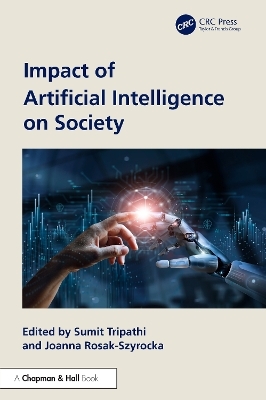
Impact of Artificial Intelligence on Society
Chapman & Hall/CRC (Verlag)
978-1-032-64324-3 (ISBN)
The book presents a comprehensive and interdisciplinary exploration of the impact of AI on various sectors of society to foster a greater understanding of the opportunities and challenges presented by this transformative technology. It explores the impact AI has had on varied sectors of society, including healthcare, education, the workplace, and the economy. It provides a holistic view of this fast-growing technology by critical study of the possible benefits and drawbacks linked with the application of AI in many industries. The book also examines the ethical, social, and economic implications of AI and the potential risks and challenges associated with its use.
Focuses on the future influence of AI, providing insights into how it could disrupt several industries and change the way we live, work, and connect with one another
Explores how AI can be used to tackle global issues such as climate change, food security, and public health concerns
Offers case studies and specific examples of how artificial intelligence is being employed in many industries, covering both successes and failures
Investigates cutting-edge technology breakthroughs in AI and how they can be used to improve efficiency, productivity, and performance across multiple industries
Understands the limitations and potential biases of artificial intelligence, as well as the significance of human monitoring and accountability
The book is intended for researchers, practitioners, policymakers, and students who are interested in understanding the nature and role of AI with regard to different sectors of society.
Dr. Sumit Tripathi is an accomplished associate professor at the Goa Institute of Management in Goa, India, bringing over 15 years of academic and research experience to his role. He earned his post-doctorate from Linkoping University, Sweden, and completed his PhD at the Indian Institute of Technology (BHU), Varanasi. Dr. Tripathi’s research interests encompass Artificial Intelligence, Machine Learning, Deep Learning, Computer Vision, and Biomedical Image Processing. His expertise is evident through numerous high-impact research papers published in esteemed conferences and journals, as well as patents in Biomedical Image Processing using Deep Learning-based Techniques. As a lifetime member of the Indian Society of Technical Education (ISTE), Dr. Tripathi is dedicated to advancing the fields of engineering education and research. Dr. Joanna Rosak-Szyrocka is assistant professor, Erasmus+ coordinator at the Faculty of Management, Czestochowa University of Technology, Poland. She specialized in the fields of digitalization, industry 5.0, quality 4.0, education, IoT, AI, and quality management. She completed a research internship at the University of Żilina, Slovakia, and at Silesia University of Technology, Poland. She has been a participant in multiple Erasmus+ teacher mobility programs: Italy, UK, Slovenia, Hungary, Czech Republic, Slovakia, and France. She cooperates with many universities both in the country (University of Szczecin, Rzeszów University of Technology, Silesian University of Technology) and abroad (including the University of Tabuk, Saudi Arabia; Széchenyi István University, Hungary; University Faisalabad, Pakistan; University of Humanities, China, University of Technology Sydney, Australia; Bucharest University of Economic Studies, Romania; and Federal University Dutse, Nigeria). She has also served as a member of the editorial boards and reviewer boards for several prestigious journals.
1: Disruptive Innovation in Medical Image Segmentation: A Comparative Study of Traditional and AI-Based Approaches 2: Applications of Transformer in Medical Imaging: A Review 3: Future of Learning: Adaptive Learning Systems based on Language Generative Models in Higher Education 4: Artificial Intelligence (AI) Integration in Higher Education: Navigating Opportunities and Ethical Frontiers in Education with Advanced Technologies 5: The Future of Higher Education: Using AI in Universities to Improve Learning Outcomes and Operational Efficiency 6: AI in Academic Research: Advances, Opportunities, and Challenges 7: Transforming Education through AI-Enhanced Content Creation and Personalized Learning Experiences 8: Exploring the Interplay of Educational Social Media Usage, Procrastination, and Subjective Well-being in the Context of Industry 5.0 9: Advancements and Challenges in Fraudulent Message Detection 10: Artificial Intelligence of Things (AIoT) Based Telehealth System Using Healthy Pi 11: Artificial Intelligence for Social Good Disaster Relief Poverty Elevation and Environmental Sustainability A New Era of Innovative Solution and Global Impact 12: Digital innovations for increasing financial inclusion: CBDC, cryptocurrency, embedded finance, Artificial Intelligence, WaaS, Fintech, Bigtech and DeFi
| Erscheinungsdatum | 21.08.2024 |
|---|---|
| Zusatzinfo | 14 Tables, black and white; 31 Line drawings, black and white; 8 Halftones, black and white; 39 Illustrations, black and white |
| Sprache | englisch |
| Maße | 156 x 234 mm |
| Gewicht | 440 g |
| Themenwelt | Mathematik / Informatik ► Informatik ► Software Entwicklung |
| Informatik ► Theorie / Studium ► Künstliche Intelligenz / Robotik | |
| Informatik ► Weitere Themen ► Hardware | |
| ISBN-10 | 1-032-64324-2 / 1032643242 |
| ISBN-13 | 978-1-032-64324-3 / 9781032643243 |
| Zustand | Neuware |
| Informationen gemäß Produktsicherheitsverordnung (GPSR) | |
| Haben Sie eine Frage zum Produkt? |
aus dem Bereich


